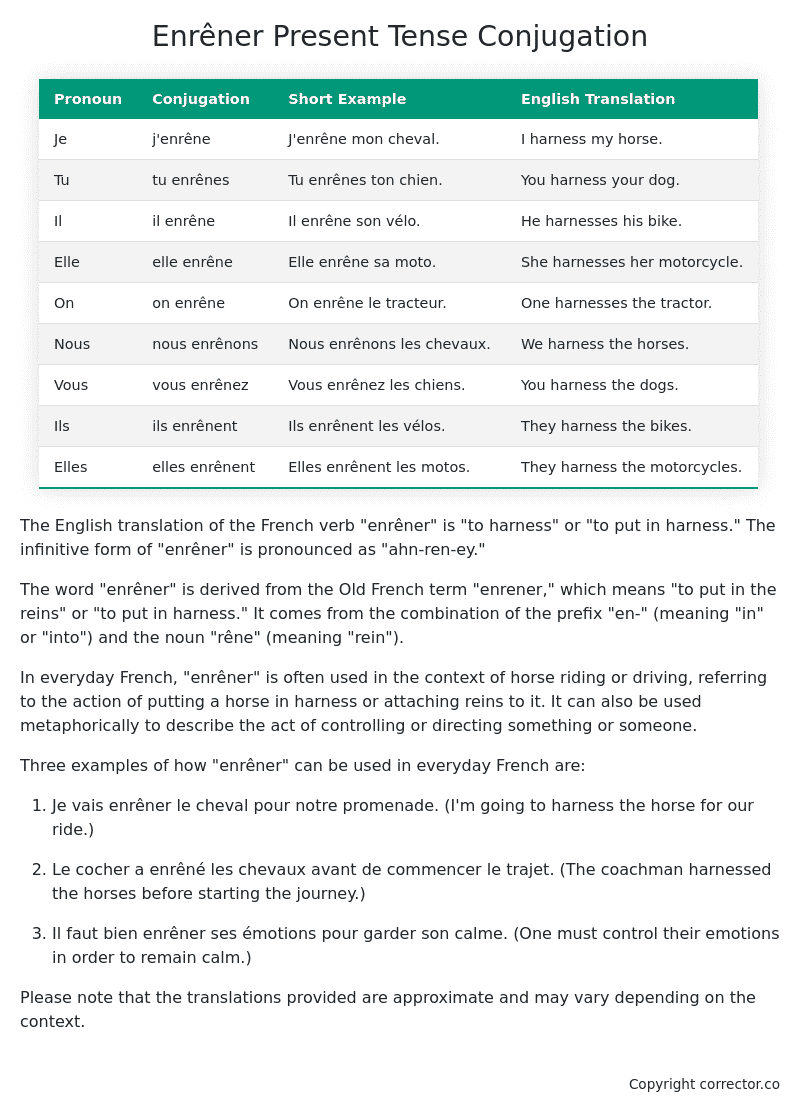Le Present (Present Tense) Conjugation of the French Verb enrêner
Introduction to the verb enrêner
The English translation of the French verb “enrêner” is “to harness” or “to put in harness.” The infinitive form of “enrêner” is pronounced as “ahn-ren-ey.”
The word “enrêner” is derived from the Old French term “enrener,” which means “to put in the reins” or “to put in harness.” It comes from the combination of the prefix “en-” (meaning “in” or “into”) and the noun “rêne” (meaning “rein”).
In everyday French, “enrêner” is often used in the context of horse riding or driving, referring to the action of putting a horse in harness or attaching reins to it. It can also be used metaphorically to describe the act of controlling or directing something or someone.
Three examples of how “enrêner” can be used in everyday French are:
-
Je vais enrêner le cheval pour notre promenade.
(I’m going to harness the horse for our ride.) -
Le cocher a enrêné les chevaux avant de commencer le trajet.
(The coachman harnessed the horses before starting the journey.) -
Il faut bien enrêner ses émotions pour garder son calme.
(One must control their emotions in order to remain calm.)
Please note that the translations provided are approximate and may vary depending on the context.
Enrêner – About the French Present Tense
To take a deep dive into all the French tenses then see our article on Mastering French Tense Conjugation.
Common Everyday Usage Patterns For Le Present
Interactions with Other Tenses
Table of the Present Tense Conjugation of enrêner
| Pronoun | Conjugation | Short Example | English Translation |
|---|---|---|---|
| Je | j’enrêne | J’enrêne mon cheval. | I harness my horse. |
| Tu | tu enrênes | Tu enrênes ton chien. | You harness your dog. |
| Il | il enrêne | Il enrêne son vélo. | He harnesses his bike. |
| Elle | elle enrêne | Elle enrêne sa moto. | She harnesses her motorcycle. |
| On | on enrêne | On enrêne le tracteur. | One harnesses the tractor. |
| Nous | nous enrênons | Nous enrênons les chevaux. | We harness the horses. |
| Vous | vous enrênez | Vous enrênez les chiens. | You harness the dogs. |
| Ils | ils enrênent | Ils enrênent les vélos. | They harness the bikes. |
| Elles | elles enrênent | Elles enrênent les motos. | They harness the motorcycles. |
Other Conjugations for Enrêner.
Le Present (Present Tense) Conjugation of the French Verb enrêner (You’re reading it right now!)
Imparfait (Imperfect) Tense Conjugation of the French Verb enrêner
Passé Simple (Simple Past) Tense Conjugation of the French Verb enrêner
Passé Composé (Present Perfect) Tense Conjugation of the French Verb enrêner
Futur Simple (Simple Future) Tense Conjugation of the French Verb enrêner
Futur Proche (Near Future) Tense Conjugation of the French Verb enrêner
Plus-que-parfait (Pluperfect) Tense Conjugation of the French Verb enrêner
Passé Antérieur (Past Anterior) Tense Conjugation of the French Verb enrêner
Futur Antérieur (Future Anterior) Tense Conjugation of the French Verb enrêner
Subjonctif Présent (Subjunctive Present) Tense Conjugation of the French Verb enrêner
Subjonctif Passé (Subjunctive Past) Tense Conjugation of the French Verb enrêner
Subjonctif Imparfait (Subjunctive Imperfect) Tense Conjugation of the French Verb enrêner
Subjonctif Plus-que-parfait (Subjunctive Pluperfect) Tense Conjugation of the French Verb enrêner
Conditionnel Présent (Conditional Present) Tense Conjugation of the French Verb enrêner
Conditionnel Passé (Conditional Past) Tense Conjugation of the French Verb enrêner
Conditionnel Passé II (Conditional Past II) Tense Conjugation of the French Verb enrêner
L’impératif Présent (Imperative Present) Tense Conjugation of the French Verb enrêner
L’impératif Passé (Imperative Past) Tense Conjugation of the French Verb enrêner
L’infinitif Présent (Infinitive Present) Tense Conjugation of the French Verb enrêner
L’infinitif Passé (Infinitive Past) Tense Conjugation of the French Verb enrêner
Le Participe Présent (Present Participle) Tense Conjugation of the French Verb enrêner
Le Participe Passé (Past Participle) Tense Conjugation of the French Verb enrêner
Struggling with French verbs or the language in general? Why not use our free French Grammar Checker – no registration required!
Get a FREE Download Study Sheet of this Conjugation 🔥
Simply right click the image below, click “save image” and get your free reference for the enrêner present tense conjugation!

I hope you enjoyed this article on the verb enrêner. Still in a learning mood? Check out another TOTALLY random French verb present conjugation!


